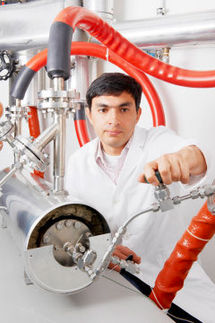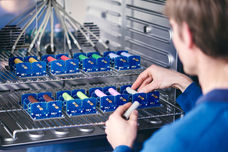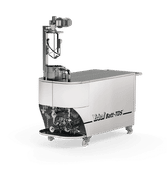TU Berlin receives more than one million dollars in funding from the United States for catalysis research
"In the field of electromobility mainly research on lithium-ion battery technology has been promoted in the past years. But the limits of this technology become more and more obvious," states Peter Strasser, a professor for chemical engineering at the TU Berlin and member of the Cluster of Excellence "Unifying Concepts in Catalysis" (UniCat).
"Thereby the idea of hydrogen based e-mobility slowly returns to the center of attention. In this technology a fuel cell, acting as an energy converter, feeds the electrical motor. Conceivably a fuel cell could also be used as a kind of ‘range extender’ - thus as an additional device to increase the cruising range – interacting with a Li-battery."
His research team constitutes part of a high-profile project of the U.S. Department of Energy (DoE), which researches new nano-structured materials. The researchers aim to make the catalytic conversion of hydrogen and oxygen into usable electricity in fuel cells more efficient and less costly. The DoE recently approved a total of 5.3 million U.S. dollars in funding for the next three years, of which approximately $ 1.5 million will go to the TU Berlin.
The TU team works closely with two industrial partners and three academic institutions, namely the Massachusetts Institute of Technology (MIT), Northeastern University and George Washington University.
Hydrogen fuel cells use molecular hydrogen to store energy. Their density is almost 200 times higher than that of a Li-ion battery. In the drive mechanism of the hydrogen-based fuel cell the chemical energy of hydrogen is converted into electrical energy. Although the practical conversion efficiency currently is only about 50 percent, an electric car requires only about six kilograms of hydrogen for a 450 km range, and refueling takes only six minutes. On the other hand, a typical Li-ion battery weighs at least 200 kilograms, takes six to nine hours for loading and provides only enough energy for a range of 200 km. In addition, if the vehicle is solely battery powered it has to be air-conditioned electrically because there is no waste heat. This again can significantly reduce the range.
"When comparing the costs, the fuel cell also scores much better," declares Strasser. "Li-ion batteries currently cost about 300 € per kilowatt hour. In a typical-sized vehicle a range of 200 kilometers amounts to about 12,000 €. Comparable performance characteristics with a fuel cell of the latest generation cost around 5,000 €; in this case the range naturally depends on the size of the tank, not of the fuel cell. "What makes fuel cells expensive is, above all, the precious metal platinum which is used as a catalyst in nanostructured form. Peter Strasser and his colleagues in the joint project want to reduce exactly this part of the costs. So far, 0.8 grams of platinum were needed per kilowatt. The scientists want to reduce this amount to 0.1 grams per kilowatt. At a platinum price of about € 40 per gram, the platinum catalyst would then only make up 400 € of the fuel cell costs. A comparable amount of platinum is currently used in each exhaust catalyst.
The work group led by Professor Strasser has been working on a new family of nanostructured fuel cell catalysts since 2005. They consist of a platinum-poor core surrounded by a thin platinum-rich shell. In the first place this reduces the required amount of platinum; secondly, the platinum-rich shell catalyzes the chemical processes far better than pure platinum. However, the life expectancy of the material during ongoing fuel cell operation is still a challenge. Strasser and his team are looking for ways to stabilize the core-shell configuration with new carrier materials, mainly nitrogen-containing carbon, but also by adding additional metal particles in the nucleus.
"Unifying Concepts in Catalysis" (UniCat) is the sole Cluster of Excellence in Germany researching the economically important field of catalysis. More than 250 chemists, physicists, biologists and engineers from four universities and two Max Planck research institutes from Berlin and Potsdam are involved in this interdisciplinary research network. The Cluster is hosted by the Technische Universität Berlin. UniCat receives funding of approximately € 5.6 million each year as part of the Excellence Initiative of the German Research Foundation.
Other news from the department science
These products might interest you
Most read news
More news from our other portals
See the theme worlds for related content
Topic World Battery Technology
The topic world Battery Technology combines relevant knowledge in a unique way. Here you will find everything about suppliers and their products, webinars, white papers, catalogs and brochures.

Topic World Battery Technology
The topic world Battery Technology combines relevant knowledge in a unique way. Here you will find everything about suppliers and their products, webinars, white papers, catalogs and brochures.






























































